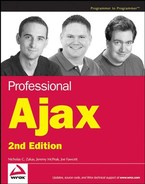Chapter 1. What Is Ajax?
From 2001 to 2005, the World Wide Web went through a tremendous growth spurt in terms of the technologies and methodologies being used to bring this once-static medium to life. Online brochures and catalogs no longer dominated the Internet as web applications began to emerge as a significant portion of online destinations. Web applications differed from their web site ancestors in that they provided an instant service to their users, not just information. Whether for business process management or personal interests, developers were forced to create new interaction paradigms as users came to expect richer functionality.
Spurred on by little-known and lesser-used technologies that had been included in web browsers for some time, the Web took a bold step forward, shattering the traditional usage model that required a full page load every time new data or a new part of the application's logic was accessed. Companies began to experiment with dynamic reloading of portions of web pages, transmitting only a small amount of data to the client, resulting in a faster, and arguably better, user experience.
At the forefront of this movement was Google. After the search giant went public, new experiments conducted by Google engineers began popping up through a special part of the site called Google Labs (labs.google.com). Many of the projects at Google Labs, such as Google Suggest and Google Maps, involved only a single web page that was never unloaded but was constantly updated nevertheless. These innovations, which began to bring the affordances of desktop software interfaces into the confines of the browser, were praised around the Web as ushering in a new age in web development. And indeed they did.
Numerous open source and commercial products began development to take advantage of this new web application model. These projects explained their technology using a variety of terms such as JavaScript remoting, web remote procedure calls, and dynamic updating. Soon, however, a new term would emerge.
